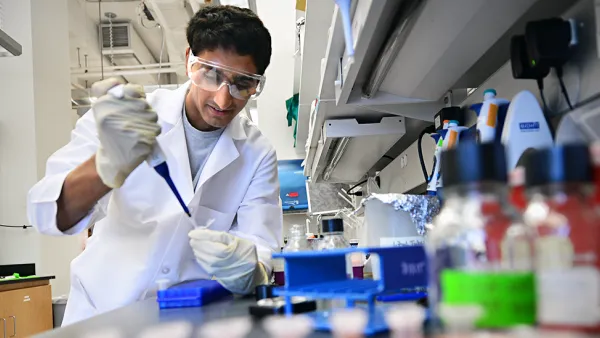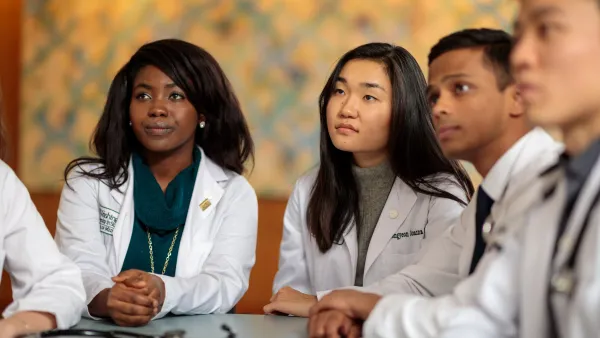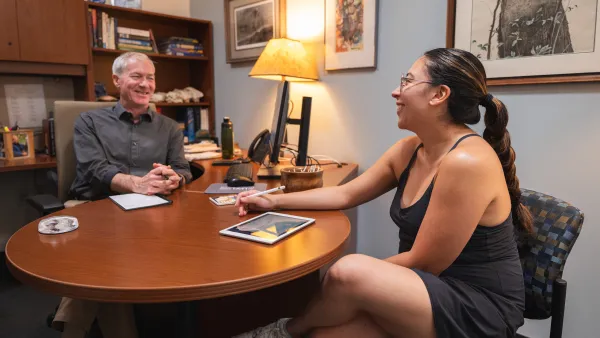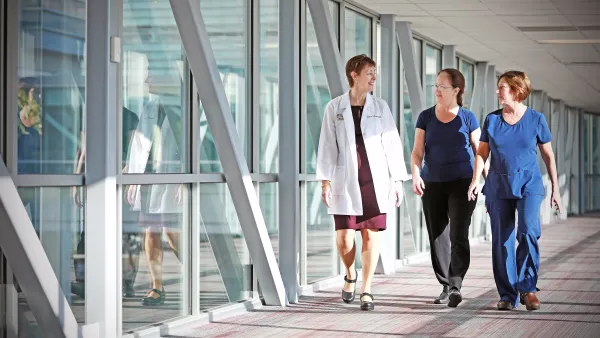If you’ve long dreamt of becoming a medical doctor, know that it’s not too late to change career paths. Learn how one of our alumni changed his career to become a doctor through our post-baccalaureate premedical program.
You may think that if you didn't major in biology or chemistry in undergrad that you missed your chance to attend medical school. Our Post-Baccalaureate Premedical Program at Washington University in St. Louis offers an students an opportunity to complete the requirements needed to successfully apply to medical school.
We spoke with an alumnus of the program, Zach Linneman about his experience. Linneman had already received his bachelor’s degree from the university, majoring in Chinese, and spent the intervening years traveling around the world, from India to the Philippines and Africa, working with malnourished children. It was then that he made the decision to pursue the road ahead and become a doctor.
Tell me a little bit about your background and educational experience.
When I came to WashU for my undergraduate degree, I was undecided about the pre-med curriculum and instead majored in Chinese. I studied four years of Chinese in high school, and I wanted to continue in college. I’m a graduate of St. Louis University High School, and I decided to take Chinese there because the program was wonderful. I started when I was 14 years old. I don’t know if that was an intentional choice apart from, “The teacher is cool, and it’s different.” I didn't have this grand plan.
In high school, I actually worked doing medical research with children who were malnourished. I have a friend whose father runs an amazing nonprofit called Project Peanut Butter and St. Louis Nutrition Project, so I went to Malawi in southeast Africa as my senior service project. I knew I could come to WashU, continue that work and study Chinese. I focused on that a lot, and I knew I could also do that after college—as a job—so I followed that path.
I would say I was more certain that I wanted to do that at the time than picking a terminal graduate school degree. During undergraduate school I’d decided not to apply for medical school. It’s a very long process, and I wasn't ready to apply when I was 20 years old.
What was your plan for after graduation?
After graduation, I went abroad. I was based in St. Louis and traveled abroad to several countries. I actually moved to Malawi for a time, and I was running all over the world. I lived in the Philippines for a month, then Malawi, then India, then back to Malawi, and then India again. And in all of those different locations, I was basically doing the same thing: working with children who were severely malnourished.
Then I took some time off and came back to St. Louis. I had an office job at a wonderful elementary school here in St. Louis called City Academy. It’s an awesome private school that awards enrollment on a scholarship basis in North City. I had done fundraising at the charity at my previous job and basically wanted to settle in St. Louis and have some time where I wouldn't be on airplanes running all over the world.
What was it like to work with malnourished children?
Traveling and seeing people in different conditions is very moving. And that really has been the way I’ve found my purpose. I needed that to decide what I should be doing with my life. There’s a lot of suffering in the world, but the way I look at it is that there’s a lot of opportunity to do something good in places where there’s a lot of need. Maybe that’s overly optimistic, because there really is a lot of suffering in the world. In India alone there are over one million children who aren’t getting what they need. It’s very sad.
I don’t know that I’m emotionally motivated, though. I’m not motivated by sadness or anger. I think of Mother Teresa, who said she just wanted to do something beautiful for God in her work. It’s a more positive way to look at suffering.
At what point did you decide to follow the trajectory to become a doctor?
I was invited to go back to India while I had that job at City Academy, and to work with some people I’d consulted for while previously in India. That’s when I really decided I should pursue medicine. I saw a lot of need for helping malnourished children, and I knew there was a post-bac program at WashU. I applied for that, with the goal of going to medical school and becoming a doctor in India.
What has your experience been like with the University College Post-Baccalaureate Premedical Program?
Currently I am in my second year—I’m almost done. Then I’ll take the MCAT in April and will start applying for schools this summer. For undergrad, I definitely had high expectations for the college, advisors and level of difficulty. Plus, it really is a paradise on campus. In short, all of my expectations have been totally met and exceeded at University College. It’s easy to think of it as just a night school, but it really has a special and important home in the university. The post-bac program is just as competitive and well-resourced as my major in the College of Arts and Sciences, as University College is actually a part of the college of Arts and Sciences. We share faculty and resources, and we can all use the Career Center.
Before I applied, I took a semester of organic chemistry to see if it was realistic for me to go on this 10-year path of medical school, then the residency and all that.
I’m now a teacher’s assistant for general chemistry and am working with a professor on cancer research in radiation oncology. He liked an assignment I wrote for a class and wanted to work on it as a research project.
What has your experience been like with advisors?
The advising is awesome. We have two advisors. I’m with Elizabeth Fogt, director of advising and student services. The first time I met her in person, she knew my story and had read my application materials. She had this whole path that I could follow, which would be challenging but straightforward. She immediately knew of three medical schools I should look into. She saw me as a person with particular talents and strengths. Our other advisor is also amazing—his name is Shawn Cummings, who is a 1987 WashU graduate.
What have you found special and unique about the program?
Our program is flexible and can be fit around each person’s strengths and needs. I had already taken general chemistry and biology, but not the other courses. I was basically able to create my own curriculum and take whatever elective classes I wanted to, but with advisors who know what they’re doing and have helped a lot of students get in to medical school.
I was able to take what I wanted, and then add classes that will help me in medical school. Now I’m taking anatomy and physiology, which will help with the MCAT and medical school. We also have something called the linkage program, which is a way to get conditional acceptance into medical school as a post-bac. We have two that I’m aware of right now: one with the University of Michigan and one with Case Western. If you meet certain requirements, it’s basically like early decision for medical school.
Currently we have about 120 active post-baccs, which doesn't count people in their application year. It’s rolling, because we admit people both semesters. And we also have lots of international students, just like the undergrad program, and people who have worked in healthcare who have decided to pursue medicine at the MD level.
Note: this post was originally published with Alive Magazine.



